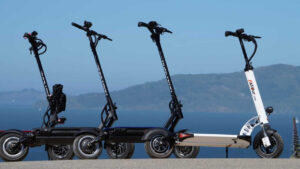In the rapidly evolving landscape of urban transportation, electric scooters have emerged as a transformative and sustainable solution, offering a clean, efficient, and convenient way to navigate city streets.
This article explores the features, benefits, and the increasing popularity of electric scooters, shedding light on how they are reshaping the way people commute in urban environments.
Clean and Green Commuting
Electric scooters are at the forefront of the green transportation revolution. Powered by electric batteries, they produce zero emissions during operation, contributing to a cleaner and healthier urban environment.
As cities worldwide grapple with air pollution concerns, electric scooters provide an eco-friendly alternative to traditional gasoline-powered vehicles.
Efficient and Agile
Electric scooters are designed for agility and efficiency, making them an ideal choice for urban commuting.
With powerful electric motors, riders can swiftly navigate through traffic, cover short distances, and effortlessly weave through crowded streets.
The compact and lightweight design adds to their agility, allowing users to maneuver through tight spaces with ease.
Last-Mile Connectivity
Electric scooters play a crucial role in addressing the last-mile connectivity challenge. They bridge the gap between public transportation hubs and final destinations, offering a convenient solution for commuters to complete their journeys.
The accessibility and portability of electric scooters make them an excellent choice for short-distance travel within urban areas.
Cost-Effective Transportation
Compared to traditional vehicles, electric scooters are highly cost-effective. With minimal maintenance requirements and lower operating costs, they provide an economical alternative for daily commuting.
Many cities have embraced electric scooter-sharing programs, allowing users to access scooters on-demand, further reducing the financial burden associated with personal vehicle ownership.
Technological Innovations
Electric scooters have embraced technological advancements to enhance the user experience.
Many models feature smartphone connectivity, GPS tracking, and integrated apps that provide real-time information on battery levels, trip history, and available charging stations.
These innovations contribute to a more connected and user-friendly commuting experience.
Charging Infrastructure
The proliferation of electric scooters has led to the development of widespread charging infrastructure.
Cities are investing in charging stations and designated areas for scooter parking and charging.
This infrastructure expansion supports the growing popularity of electric scooters and ensures that users have convenient access to charging facilities.
Community Engagement
Electric scooters have become a symbol of community engagement, encouraging people to adopt sustainable and shared transportation practices.
As users embrace this mode of commuting, they actively contribute to reducing traffic congestion, lowering carbon emissions, and fostering a sense of environmental responsibility within their communities.
Conclusion
Electric scooters have firmly established themselves as a transformative force in urban mobility. With their eco-friendly operation, efficiency, and technological integration, they offer a compelling alternative for individuals seeking a practical and sustainable way to navigate city streets.
As cities continue to prioritize sustainable transportation solutions, electric scooters are set to play an increasingly prominent role in shaping the future of urban commuting.



